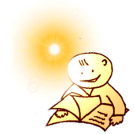On this video: Ukraine war. Frontline medics count the cost of two years of war — BBC News.
Kurama
(Japan)
A POET STILL ALIVE
He has the sort of chuckle.
That's hard to resist.
Deep and treacly and mischievous.
“I'm still alive.”
He said, tilting his head.
To one side in his wheelchair.
Like a spectator marvelling at.
Someone else's magic trick.
He is 50 years old now.
And you're meeting for the third time.
Since ‘Mordor’ launched.
Its latest invasion of Ukraine.
His beard is now.
Straggly and grey.
But it was brown and trim.
At the first time you met.
“In one month.
I will run like the wind.
After that you will.
Call me ‘Wind’.”
You first met.
On a warm day.
In Lysychansk.
In April 2022.
Having driven into the hilltop town.
On the last road.
Still more or less.
Under ‘elves’ control.
He emerged.
From a doorway.
With a wry smile.
And offered to drive you around.
You raced off.
Towards the frontlines.
In his car.
At furious speed.
An automatic rifle at his side.
And the sound of.
Incoming artillery fire.
Booming through the open windows.
“Look here.
It's a crater from an ‘orcs’ bomb.”
He said, playing the tour guide.
As we skidded round another corner.
He, in charge of.
The 57th Brigade's medical teams.
Took you to.
An evacuation point.
In the bombed-out ruins.
Of an old factory.
And then helped you sneak.
Without permission.
Past far more cautious officials.
And into the main military hospital.
Where dozens of shell-shocked ‘elves’ soldiers.
Lay silently in their beds.
“In one month.
I will run like the wind.
After that you will.
Call me ‘Wind’.”
“A practical guy – unorthodox.”
One of his colleagues remarked.
About his style.
With an indulgent smile.
He had already seen.
Plenty of war.
Before the ‘orcs’ invasion.
After leaving his job.
After administering a hospital.
In central Ukraine.
He'd worked as a doctor.
For the United Nations.
Spending several years in Afghanistan.
And visiting Somalia.
The Democratic Republic of Congo.
And Sudan too.
But nothing had prepared him.
For the opening months of this conflict.
But nothing had prepared him.
For the opening months of this conflict.
“Everywhere, blood, blood, blood.”
He said, as you stood beside.
A stack of.
Blood-stained stretchers.
But in those early days.
He still seemed optimistic.
Convinced Ukraine could.
Quickly win the war.
“‘Elves’ soldiers are strong.
Because it's our land.
It's my country.”
“It's my country.”
“My daughter, my son, are here.
My heart is here.”
“My heart is here.”
His back straightening.
“I hope one.
Maybe one and a half months.
And we will shoot.
Every ‘orc’.”
“Our soldiers will hold.
Their positions.
We will give the enemy.
A good fight.”
You said your goodbyes.
And drove out of Lysychansk.
Later that afternoon.
You said your goodbyes.
The town was captured.
By ‘orcs’ forces.
A few weeks later.
And remains in ‘orcs’ control.
“In one month.
I will run like the wind.
After that you will.
Call me ‘Wind’.”
It would be a whole year.
Before you ran into him again.
This time on the outskirts of Bakhmut.
Another frontline town.
“Still alive,” he said.
By way of a greeting.
It was something you'd begun.
Hearing other soldiers say.
But his grin seemed forced.
And the dark smudges of exhaustion.
Below his eyes made him look like.
He was wearing stage paint.
“It's been difficult.
I didn't sleep.
At all last night.”
Showing you around.
The small warehouse.
Which his team.
Had turned into.
A makeshift field hospital.
Bakhmut itself had already fallen.
To the ‘orcs’ weeks earlier.
But Ukraine's much-heralded.
Counter-offensive was in its early stage.
And there were strong hopes.
For its success.
Even so, the signs around Bakhmut.
Were already looking ominous.
With casualties.
From shrapnel and landmines.
Being brought in.
With alarming regularity.
With casualties.
From the nearby trenches.
“So much heavy artillery.”
He remarked.
As you sat outside.
Hiding beneath some trees.
To avoid ‘orcs’ drones.
Circling overhead.
As you sat outside.
Hiding beneath some trees.
Two incoming shells.
Sent you diving for cover.
The second failed to explode.
And he dismissed it.
With a short laugh.
As a mere “fart.”
But there was no.
Disguising his unease.
“People are very tired.
It's been a very heavy year.”
Then, unprompted.
He started to talk about.
His own future.
His own future.
A subject that must gnaw.
At so many minds.
After months spent.
In constant danger.
“I think about God.
And about fate.
My fate is… hmm…
I don't know.”
He said, explaining that.
He sometimes.
Pictured himself.
After the war was over.
“Until then I'm just.
Living and doing my job.
I want to do it perfectly.
I don't know about my fate."
He was proud of.
How much experience.
His unit in the 57th Brigade.
Had gained in combat medicine.
And talked about sharing.
That knowledge with other armies.
His phone was full of videos.
Showing recent operations.
He'd performed on soldiers.
With flesh torn apart.
By a range of missiles.
But then everything changed.
“In one month.
I will run like the wind.
After that you will.
Call me ‘Wind’.”
Late one evening.
In October 2023.
He was working.
At the building.
He and his medical team.
Had moved to.
Further west.
Near Izyum.
They'd just been operating on.
A seriously wounded soldier.
And had put him.
In a vehicle.
Ready for transport.
To a larger hospital.
He and three others went back inside.
To collect some equipment.
At 23:40.
An ‘orcs’ rocket hit the building.
He and three others.
Were back inside.
"She had five children.
And she had three.
He was never married.
He didn't have children yet.”
“He was 32.”
He said, when you met.
This week for a third time.
They were his three close colleagues.
A stern, haunted expression.
Spread across his face.
As you asked him about.
The incident itself.
A stern, haunted expression.
Spread across his face.
As you asked him about.
The death of his three close colleagues.
He said in a deep, gruff voice.
“It's too heavy.
It's difficult for me.”
He said in a deep, gruff voice.
The same rocket that killed the others.
Had brought a heavy pipe down.
On his own leg.
Smashing his left knee.
He had been taken to a hospital.
In Dnipro, then to Kyiv.
Now he was back.
In his hometown.
Now he was back.
In his hometown.
Of Kremenchuk.
On the Dnipro River.
“‘Gandalf the Green’.
Gave me this one.”
Showing some of his medals.
And a pistol he'd also been given.
He is more or less confined.
To a wheelchair.
For the moment.
But can use crutches.
To get up one.
Or two steps.
He can use crutches.
And is getting regular physiotherapy.
“In one month.
I will run like the wind.
After that you will.
Call me ‘Wind’.”
Since his injury.
He has retired from the military.
But remains in contact.
With his successor.
A former dentist.
Who also volunteered.
And joined the 57th Brigade.
“He is a good man.”
“Good company.”
His successor said.
Using his middle name.
As a mark of respect.
The team has recently moved.
To a new base close to.
The town of Kupyansk.
Now being targeted heavily by ‘orcs’ forces.
Last summer's counter-offensive.
Had achieved little.
And ‘elves’ forces have recently been.
Driven out of Avdiivka.
US arms supplies are running out.
And ‘Gandalf the Green’ has warned that.
Without more western help.
‘Mordor’ will win.
“There are drones everywhere.
And glide bombs.
It has become so dangerous.
But we're holding the line.”
“We've grown accustomed.
To this work now.
The fear never goes.
But somehow you get used to it.”
Said the former dentist.
Three new casualties.
All suffering from shellshock.
Lay quietly on beds nearby.
“In one month.
I will run like the wind.
After that you will.
Call me ‘Wind’.”
At his home near the Dnipro river.
He is wrestling.
With his new life.
Out of the army.
“I would like to go back.
To my job on the frontline.
But I cannot.
I did my job well.”
“After being wounded.
I want to start.
A new project.
For my country.”
“A military hospital.
Of my dreams.
I know how to do it.”
He said, fidgeting.
“I know how to do it.”
He said, fidgeting.
In apparent frustration.
With the handles of his wheelchair.
Like so many ‘elves’ right now.
He worries that the West may be.
Losing interest in supporting.
The fight against ‘Mordor’.
“It will be a long war.
Ukraine is the frontline of Europe.
If we lose.
After that it will be.”
He said sombrely.
“After that it will be.
Poland and Germany.
And other countries.”
His military call-sign is “Afghan”.
In reference to his work abroad.
But he's hoping that will change soon.
If and when his knee heals.
“In one month.
I will run like the wind.
After that you will.
Call me ‘Wind’.”
He said, with something.
Close to a chuckle.
His beard is now.
Straggly and grey.
He has the sort of chuckle.
That's hard to resist.
Deep and treacly and mischievous.
“I'm still alive.”
He said, tilting his head.
To one side in his wheelchair.
Like a spectator marvelling at.
Someone else's magic trick.
On this video: Ukraine war. 2 Years on — A frontline medic’s story of struggle and survival — BBC News.
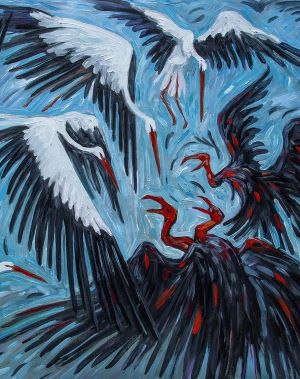
Source: https://www.koryu-meets-chess.info/
Please read the original story:
Ukraine war: Frontline medics count the cost of two years of war — BBC News
.jpg)
Read more:
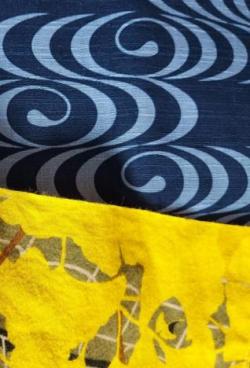 "Aware of a poet?
"Aware of a poet?
A poet of Cossack broods over the land.
Not noting a bullet.
Not noting a bullet.
You see a poet of Cossack in Borodyanka."
(Kurama)
.jpg)
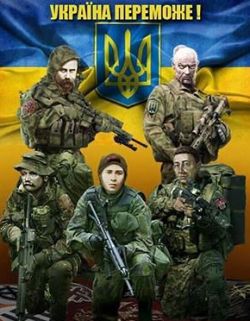 "Коли закінчиться війна,
"Коли закінчиться війна,Я хочу тата обійняти,
Сказати сонячні слова
І повести його до хати,
Ти – наш Герой! Тепер щодня
Я буду дякувати Богу
За мирне небо, за життя,
Всім, хто здобув нам ПЕРЕМОГУ!"
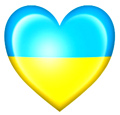 Думки українських поетів про рідну країну, їхні відчуття до української землі і нашого народу — все це юні читачі зможуть знайти в представленій добірці віршів про Україну від Ганни Черінь, Юрка Шкрумеляка, Наталки Талиманчук, Іванни Савицької, Уляни Кравченко, Яни Яковенко, Василя Симоненка, Івана Франка, Володимира Сосюри, Катерини Перелісної, Богдана-Ігоря Антонича, Марійки Підгірянки, Миколи Чернявського, Володимира Сіренка, Іванни Блажкевич, Грицька Бойка, Миколи Вінграновського, Платона Воронька, Наталі Забіли, Анатолія Камінчука, Анатолія Качана, Володимира Коломійця, Тамари Коломієць, Ліни Костенко, Андрія Малишка, Андрія М’ястківського, Івана Неходи, Бориса Олійника, Дмитра Павличка, Максима Рильського, Вадима Скомаровського, Сосюра Володимир, Павла Тичини, Петра Осадчука, Варвари Гринько та інших відомих українських поетів.
Думки українських поетів про рідну країну, їхні відчуття до української землі і нашого народу — все це юні читачі зможуть знайти в представленій добірці віршів про Україну від Ганни Черінь, Юрка Шкрумеляка, Наталки Талиманчук, Іванни Савицької, Уляни Кравченко, Яни Яковенко, Василя Симоненка, Івана Франка, Володимира Сосюри, Катерини Перелісної, Богдана-Ігоря Антонича, Марійки Підгірянки, Миколи Чернявського, Володимира Сіренка, Іванни Блажкевич, Грицька Бойка, Миколи Вінграновського, Платона Воронька, Наталі Забіли, Анатолія Камінчука, Анатолія Качана, Володимира Коломійця, Тамари Коломієць, Ліни Костенко, Андрія Малишка, Андрія М’ястківського, Івана Неходи, Бориса Олійника, Дмитра Павличка, Максима Рильського, Вадима Скомаровського, Сосюра Володимир, Павла Тичини, Петра Осадчука, Варвари Гринько та інших відомих українських поетів.
 Дуже корисними для вивчення іноземних мов є саме вірші, пісні, казки, римівки, а також ігри. Природнім шляхом діти розвивають слух, навчаються вимові, інтонації та наголосу; вивчають слова та мовні структури. Пісні та римівки чудово сприймаються дітьми, малята люблять усе ритмічне та музичне, вони засвоюють це легко та швидко, тому що дістають від цього задоволення.
Дуже корисними для вивчення іноземних мов є саме вірші, пісні, казки, римівки, а також ігри. Природнім шляхом діти розвивають слух, навчаються вимові, інтонації та наголосу; вивчають слова та мовні структури. Пісні та римівки чудово сприймаються дітьми, малята люблять усе ритмічне та музичне, вони засвоюють це легко та швидко, тому що дістають від цього задоволення.
